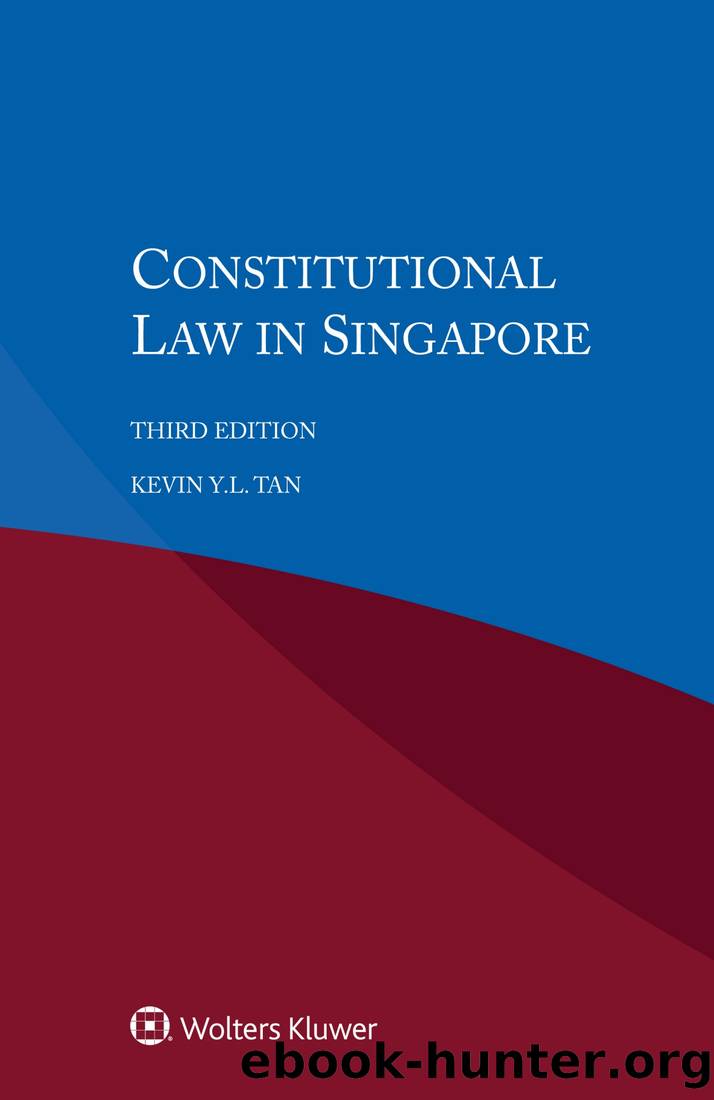Constitutional Law in Singapore by Kevin Y.L. Tan

Author:Kevin Y.L. Tan [Tan, Kevin Y.L.]
Language: eng
Format: epub
ISBN: 9789065449443
Published: 2014-03-14T16:00:00+00:00
§8. CONSTITUTION OF SINGAPOREâS JUDICIARY
352. Singaporeâs judiciary may be divided into the Supreme Court and the Subordinate Court. The Supreme Court comprises the Court of Appeal (as Singaporeâs highest court) and the High Court, while the Subordinate Courts comprises a number of courts, including the Magistratesâ Court, District Court and even the Small Claims Tribunal.
I. The Court of Appeal
353. The Court of Appeal consists of the following judges: (a) the Chief Justice as President of the Court; (b) Vice-Presidents of the Court of Appeal; (c) Judges of Appeal (other than Vice-Presidents); and (d) other puisne judges of the High Court who may be appointed from time to time. As its name suggests, the Court of Appeal has only appellate jurisdiction over all civil and criminal matters. It sits as a bench of at least three judges, but may sit as a bench of five or even seven. At present, there are only four judges appointed to this Court â the Chief Justice and three Judges of Appeal, with one of them serving as Vice-President of the Court.
354. Under the Supreme Court of Judicature Act, a Judge of Appeal may also preside in the High Court when he or she is otherwise unoccupied in the Court of Appeal. This means that the Chief Justice and the Judges of Appeal can sit in the High Court exercising original or appellate jurisdiction. At the same time, if help is needed up in the Court of Appeal, the Chief Justice is empowered to appoint a puisne judge to sit in the Court of Appeal. These provisions enhance the efficiency of the courts. However, this has been rare since 2006.
355. An appellate court such as the Court of Appeal only hears appeals on points of law and not points of fact. In other words, the Court of Appeal will not re-examine witnesses, documents and other materials tendered in the trial court. It will only consider points of law and their application to the particular case. The decision of the Court of Appeal on any matter is final and cannot be reopened or reheard in any other court. The Court of Appealâs decision is also binding on all other courts in the judicial hierarchy except itself. To qualify for appointment to the Court of Appeal, a person must have the same qualifications required for that of puisne judge (see below).
Download
This site does not store any files on its server. We only index and link to content provided by other sites. Please contact the content providers to delete copyright contents if any and email us, we'll remove relevant links or contents immediately.
| Comparative | Conflict of Laws |
| Customary | Gender & the Law |
| Judicial System | Jurisprudence |
| Natural Law | Non-US Legal Systems |
| Science & Technology |
American Kingpin by Nick Bilton(3886)
Future Crimes by Marc Goodman(3598)
The Meaning of the Library by unknow(2571)
Inside the Middle East by Avi Melamed(2356)
Why Nations Fail: The Origins of Power, Prosperity, and Poverty by Daron Acemoglu & James Robinson(2297)
On Tyranny by Timothy Snyder(2232)
Living Silence in Burma by Christina Fink(2071)
Putin's Labyrinth(2022)
The Mastermind by Evan Ratliff(1937)
The Smartest Kids in the World by Amanda Ripley(1856)
Think Like a Rocket Scientist by Ozan Varol(1820)
Law: A Very Short Introduction by Raymond Wacks(1747)
It's Our Turn to Eat by Michela Wrong(1731)
The Rule of Law by Bingham Tom(1698)
Philosophy of law a very short introduction by Raymond Wacks(1670)
Leadership by Doris Kearns Goodwin(1638)
A Dirty War by Anna Politkovskaya(1630)
Information and Communications Security by Jianying Zhou & Xiapu Luo & Qingni Shen & Zhen Xu(1621)
Civil Procedure (Aspen Casebooks) by Stephen C. Yeazell(1556)
